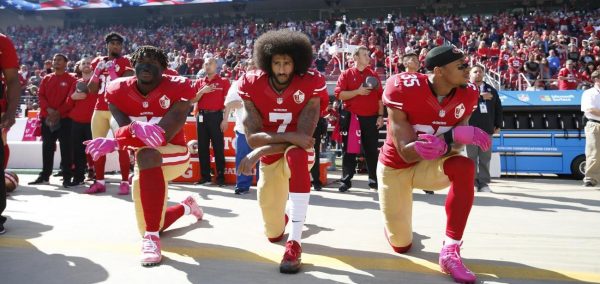
The anthem decision: Ohio State students weigh in on National Anthem protests
The #TakeAKnee movement is sweeping the league
The National Anthem once represented a message of unity, a moment where stadiums full of people stood together as one. But lately, in the NFL, the focus has turned to division and anger.
On September 24 at 11:14AM, Bleacher Report issued a statement prior to the Pittsburgh Steelers game announcing that the team would remain in the locker room during the National Anthem.
Later that afternoon, they posted a follow up stating "No Steelers were on the sidelines during the anthem", with the exception of Army veteran LT Alejandro Villanueva.
The issue has become a media frenzy, partially due to messages like those tweeted by Bleacher Report that do not accurately portray every aspect of the protest. Many other teams have also taken a stance, choosing to take a knee or link arms during the playing of the National Anthem.
The NFL has been engaged in a national debate over race, patriotism, protest, and the president since 2016. To present a different side of the argument, I asked Ohio State students to comment on the act of dissension.
Natalie DeLeon, Criminology & Criminal Justice Studies
"I totally think that people should take a stand up against racism and I fully support equal rights and people's right to protest and have their voices heard because I think it's important. However, when it comes to the National Anthem, I think it's time to put all of that aside and respect those that fought and continue to fight for our freedom. I feel as though it is disrespectful to those that have given us the right to protest and the National Anthem is where we can put our differences aside for 5 minutes and come together as a country."
Caitlin Stives, Biology
"Whether you support Trump or not, I don't see any benefit in kneeling during our National Anthem. Our anthem has nothing to do with the current president, instead, it is meant to honor the country that YOU are a part of. We respect the National Anthem because it represent everything American stands for, the people who fought to protect it, and everyone who is living in freedom here. You don't need to disrespect all of America because you don't agree with one president."
Curtis Issacson, Computer Science
"Honestly, I'm of the belief that kneeling is not an acceptable way of showing an option of current political issues, as it does not show proper respect to those who have died for this country. That being said, there are significant race related issues that NEED to be addressed and standing idly by during the [National] Anthem is not an acceptable solution either. These players, with as much influence as they have, should take better advantage of their station. For example, if they could hold a rally, or make a sign to hold during the game, they could have just as much, if not MORE, of a political impact while still maintaining respect for the flag than kneeling would ever have. Overall, I believe that the NFL players hearts are in the right place, however, their methods of displaying their views has much to be improved."
Two of the most common arguments against #TakeAKnee are abuse of the 1st Amendment and blatant disrespect for those who have fought for the United States.
In order to hold a position on either side of the movement one must first have some sort of knowledge pertaining to the 1st Amendment. According to the U.S. Constitution, Amendment I states:
"Congress shall make no law respecting an establishment of religion, or prohibiting the free exercise thereof; or abridging the freedom of speech, or of the press; or the right of the people peaceably to assemble, and to petition the government for a redress of grievances."
The fundamental argument in favor of the previously mentioned protests should be that the right to kneel during our National Anthem is protected by the United States Constitution, which our soldiers fight to protect.
In October 2016, Colin Kaepernick first sparked the debate about privilege, pride, and patriotism by taking a knee. The 49ers QB originally initiated the protest against police brutality. Kaepernick started kneeling in protest during Obama's presidency.
Trump insinuated himself into the debate by weighing in on the issue during a campaign rally in Alabama, saying he wished NFL players would be fired for kneeling during the National Anthem. The movement has evolved into a somewhat direct resistance to the president due to his blatant misunderstanding of the protests.
As early as the 1960's, athletes began using their platform to protest. During a medal ceremony at the 1968 Summer Olympics in Mexico City, two African-American track athletes, Tommie Smith and John Carlos, made what would become one of the most famous political protests in the history of sports.
So, to Erick Erickson who said, "Taking a knee did not stop a shooting in Chicago or raise anyone out of poverty," I say wearing pink doesn't cure breast cancer, but we do it to raise awareness.
Featured Image courtesy of Sports Illustrated.
